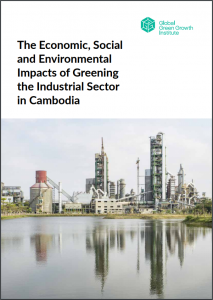 PHNOM PENH – October 29, 2018 – A new Global Green Growth Institute (GGGI) report finds investment in resource efficient technology can foster Cambodia’s economic growth, while yielding important social and environmental benefits. An economic modeling exercise undertaken by GGGI asserts that greening the industrial sector can modernize Cambodia’s industrial structure from a labor-intensive industry to a skill-based industry, integrating local businesses into global and regional supply chains.
PHNOM PENH – October 29, 2018 – A new Global Green Growth Institute (GGGI) report finds investment in resource efficient technology can foster Cambodia’s economic growth, while yielding important social and environmental benefits. An economic modeling exercise undertaken by GGGI asserts that greening the industrial sector can modernize Cambodia’s industrial structure from a labor-intensive industry to a skill-based industry, integrating local businesses into global and regional supply chains.
“Implementing green growth and climate commitments through green industrial development can help to accelerate progress towards sustainable development and poverty reduction through, for example, more sustainable use of natural resources, efficiencies in the use of energy and water, and valuation of ecosystem services,” said HE. E Vuthy, Deputy Secretary General, National Council for Sustainable Development.
The industrial sector in Cambodia is a driver of economic growth, job creation, and poverty reduction. Its contribution to Gross Domestic Product (GDP) grew from 17% in 1998 to 29% in 2016. For Cambodia to continue to diversify and expand its economy, new ways must be found to increase productivity and access more premium markets.
Using integrated System Dynamics (SD) modeling, a “Green Industry Scenario” was analyzed by GGGI for four industrial subsectors: food processing, garments manufacturing, bricks manufacturing and electronics manufacturing. This scenario illustrates how a green approach can improve resource productivity and decouple growth from environmental impact. The scenario demonstrates that the introduction of green technology can lead to an increase in real GDP of USD 2.7 billion by 2030, or otherwise an improvement of 46% for the garments sector, 14.7% for bricks, 33% for food processing, and 35.5% for electronics. Greening these industrial sub-sectors can create 512,000 additional jobs and reduce greenhouse gas emissions with 3.37 million tons – 17% reduction in the garment sector and a 30% reduction in electronics.
The GGGI study also asserts that benefits largely outweigh the required investments. Under the Green Industry Scenario, while the investment required totals USD 4.24 Bn by 2030 (or 2% of GDP over the next 10 years), the benefits reach USD 28.49 Bn. The benefits are 6.7 times larger than the investment required.
The report concludes that public support is necessary to tap into these economic opportunities. It points to policy opportunities in introducing targeted mandates, standards, incentives and skill development that would encourage investment in clean technology and increase value addition of industrial products. Through strong and incontrovertible economic analysis, the study argues in favor of an economic case for a green industry that can strengthen competitiveness, diversification and export potential of Cambodian industries, pushing the country forward in its march towards technology and knowledge-based industries.
Want to know more?
Read the Summary Brochure here.
Tomorrow’s Green Growth Knowledge Platform (GGKP) webinar will be dedicated to green industry, featuring Andrea Bassi, founder and CEO of KnowlEdge Srl, Tilman Altenburg, Head of Sustainable Economic and Social Development at the German Development Institute / Deutsches Institut für Entwicklungspolitik (DIE), Ozunimi Iti, Project Manager at the United Nations Industrial Development Organization (UNIDO), and Eva Zabey, Director of Redefining Value at the World Business Council for Sustainable Development (WBCSD).
30 October 2018 at 3:00PM CET Register: ggkp.org/ZwG Learn more: ggkp.org/Zwx